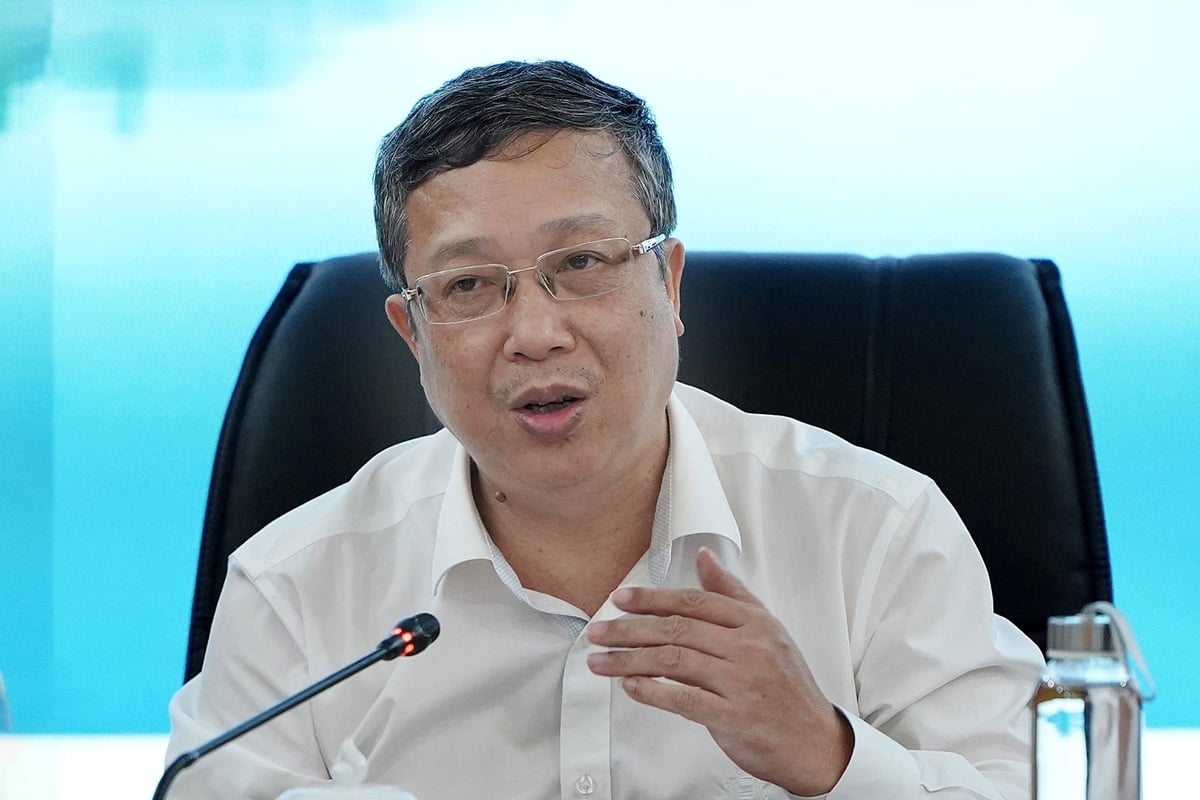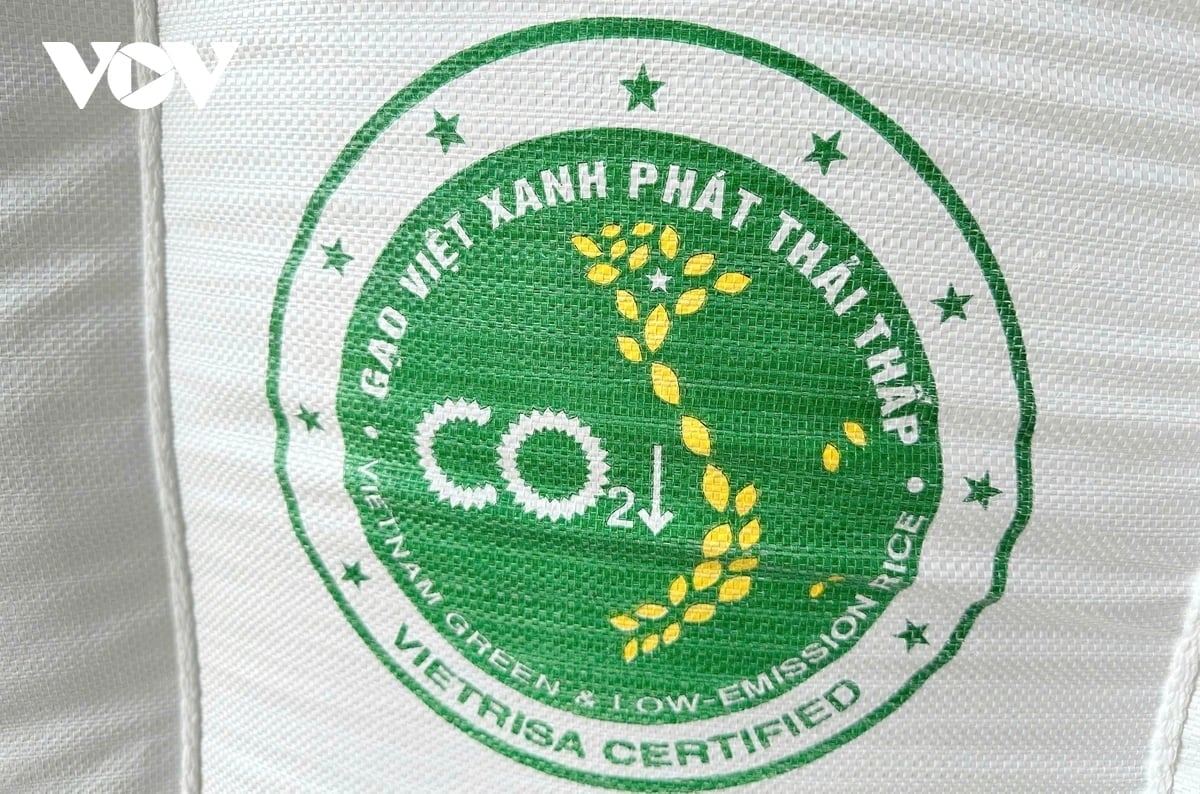December 1, 2025 | 09:57 GMT +7
December 1, 2025 | 09:57 GMT +7
Hotline: 0913.378.918
December 1, 2025 | 09:57 GMT +7
Hotline: 0913.378.918
"Promoting low-emission farming isn't about chasing carbon credits. It's about building Vietnam's national brand and securing real economic returns,” said Deputy Minister of Agriculture and Environment Hoang Trung at a preparatory meeting on July 28, ahead of the upcoming Consultation Conference on the Emissions-Reducing Crop Production Project.

Deputy Minister Hoang Trung emphasized that reducing emissions in agriculture aims to build a national brand and increase economic efficiency. Photo: Bao Thang.
According to the Deputy Minister, the project's core aim is to create high-value agricultural products that satisfy increasingly strict environmental requirements in both domestic and export markets. Labeling certified low-emission products is, therefore, not only a marketing tool but also a strategic move to claim a position in global supply chains.
International markets, especially in Europe, are rolling out regulations tied to carbon footprints throughout the agricultural production process. “If we don’t start now, we will lose our competitive edge,” Hoang Trung warned, stressing that the Monitoring, Reporting, and Verification (MRV) process must be transparent, internationally credible, and tailored to Vietnam’s conditions.
During the session, technical departments under the Ministry unanimously agreed to incorporate certification of low-emission crops and fertilizers into the project's objectives. This reflects a shared vision that Vietnam must prepare for a future in which carbon-conscious agriculture will be the norm rather than the exception.
Nguyen Nhu Cuong, Deputy Director of the Department of Science and Technology, emphasized that product certification will soon become a non-negotiable entry ticket to high-standard markets like the EU. Establishing a robust MRV system is, in his view, the first step to ensuring transparency and trust in Vietnam’s agricultural production.
"To meet these standards, we must reform production at its core," Cuong noted. This includes reducing chemical inputs, making better use of agricultural by-products, conserving water, and embracing sustainable farming practices. Though challenging, this transformation also presents a rare opportunity to restructure Vietnamese crop production along greener, more resilient lines.
Dr. Mai Van Trinh, Director of the Institute of Agricultural Environment, outlined the five crops targeted in the draft project: rice, coffee, banana, cassava, and sugarcane. These were selected based on their extensive cultivation areas and high emissions intensity.

Labeling crop products that reduce greenhouse gas emissions is emerging as a strategic lever to boost the Vietnam's global image.
“For dryland crops, every 100 kg of nitrogen fertilizer results in the release of about 1 kg of N₂O—a greenhouse gas roughly 300 times more potent than CO₂,” Dr. Trinh explained.
Rice, the largest emitter among crops, requires a multifaceted approach. Dr. Trinh proposed four primary solutions: switching to dry crops in inefficient zones, promoting rice-shrimp integrated systems, adopting alternate wetting and drying irrigation methods, and crucially, reusing post-harvest straw.
“Instead of burning it, straw can be turned into mushroom substrate, compost, or biochar using anaerobic pyrolysis technology. These methods not only cut emissions but also boost farmers’ incomes,” he said.
To support these strategies, the Institute is rolling out a field-based system to measure real-time greenhouse gas emissions. These data will serve national inventory needs and future product certification schemes, helping Vietnam define a reliable MRV baseline—especially for rice.
Deputy Minister Hoang Trung welcomed the proposals but stressed that economic outcomes must be clearly demonstrated. “Farmers will only adopt change when it benefits them,” he said. “Each model must show that on the same land area, income increases, either through reduced costs or better prices from certified products”.
He also instructed the Plant Production and Protection Department to revise the project’s overarching goals to be more concise and focused, while including communication strategies to raise public awareness.
Beyond the immediate goals, Deputy Minister Trung called for the project’s outlook to extend through 2035, avoiding limitations on geography or crop types. While maintaining clear priority groups, he urged flexibility to adapt to emerging opportunities and regional needs.
The Ministry of Agriculture and Environment will host the Consultation Conference on July 30 at its Hanoi headquarters, with around 200 delegates expected. The event will gather input from international organizations, enterprises, farmers, and researchers. Alongside discussions, it will showcase successful low-emission models and technologies introduced by global institutions and domestic research centres.
The Ministry has also tasked the Department of Climate Change with updating key policies on emissions reduction and the carbon market. These updates are expected to help farmers and enterprises navigate the shift toward certified, low-emission crop production.
“Transitioning from conventional to certified sustainable farming is inevitable”, concluded Deputy Minister Hoang Trung. “The real question is how we brand it, how effectively we implement it, and how genuinely we deliver value to our farmers”.
With the world watching and trade rules tightening, labeling emissions-reducing agricultural products may soon be more than a green badge, it may be the golden passport for Vietnam’s farm exports.
Translated by Linh Linh

(VAN) The Provincial Competitiveness and Governance Index (PCGI) is a tool designed to reflect the quality of local governance.

(VAN) An environmental expert has outlined eight strategic actions for Vietnam to successfully meet its commitment to achieve Net Zero emissions by 2050.

(VAN) After the institutional merger, Da Nang possesses significant forest-carbon reserves and is proactively engaging in the carbon market, creating a new revenue stream.

(VAN) An Giang strengthens communication against IUU fishing, increases inspections and sanctions, and is determined to remove the EC’s “yellow card” while developing a sustainable fisheries sector.

(VAN) As green transition becomes a global trajectory, Viet Nam’s biggest challenge is not only technology and models, but how to ensure that capital flows reach the right beneficiaries.

(VAN) The Ministry of Agriculture and Environment must spearhead the construction of green governance, spanning decision-making processes and investment standards to policy evaluation mechanisms.

(VAN) The Agriculture and Environment sector of Khanh Hoa has achieved numerous milestones over the past 80 years, contributing significantly to the goal of establishing the province as a centrally governed city by 2030.